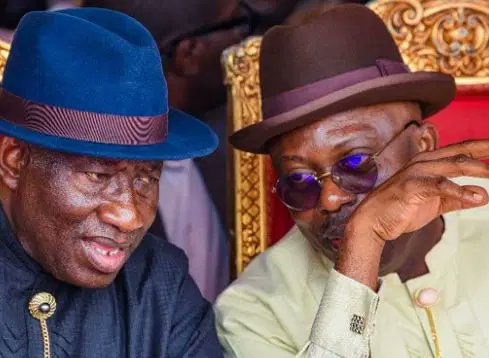Politics
Goodluck Jonathan: Fubara’s Suspension Tarnishes Nigeria’s Global Reputation

Former Nigerian President Goodluck Jonathan has expressed concern over the recent suspension of Rivers State Governor Siminalayi Fubara and several lawmakers, stating that the situation tarnishes Nigeria’s democratic image. Jonathan made these remarks while addressing the ongoing political crisis in Rivers State, which has seen escalating tensions between different factions of the state government.
The crisis in Rivers State took a new turn when the State House of Assembly, dominated by lawmakers loyal to former Governor Nyesom Wike, moved to suspend Governor Fubara. Alongside the governor, several lawmakers aligned with him have also faced suspension, deepening the political instability in the state. The development has drawn widespread criticism, with many viewing it as a threat to democratic principles.
Jonathan, who has remained vocal about the importance of upholding democratic values, warned that such actions undermine Nigeria’s credibility on the global stage. He emphasized that political conflicts should be resolved through dialogue and constitutional means rather than through force or arbitrary suspensions. According to him, Nigeria’s democratic institutions must remain strong and independent to maintain both domestic and international confidence.
The crisis in Rivers State has been ongoing for months, fueled by a power struggle between Governor Fubara and his predecessor, now Minister of the Federal Capital Territory, Nyesom Wike. The tensions escalated following Fubara’s efforts to assert his authority as governor, which have been met with resistance from lawmakers and political figures loyal to Wike. The division within the state government has resulted in legal battles, violent clashes, and now, the controversial suspensions.
Jonathan’s statement adds to a growing list of voices calling for an end to the political turmoil. Various political analysts and civil society groups have condemned the recent developments, warning that such instability could set a dangerous precedent for other states. The former president stressed that Nigeria’s democracy must be protected from actions that weaken its institutions and create uncertainty.
Observers have pointed out that Rivers State has historically been a hotbed of political tension, given its economic significance and strategic importance. The state is one of Nigeria’s richest due to its oil resources, making it a key battleground for political influence. The current crisis has raised concerns about governance and stability in the region, with some fearing that prolonged conflicts could affect economic activities and public trust in leadership.
Jonathan urged political leaders in the state to prioritize the interests of the people over personal or factional disputes. He called on stakeholders, including the judiciary and security agencies, to ensure that democratic principles are upheld and that conflicts are resolved in accordance with the law. His comments reflect broader concerns that Nigeria’s democratic progress could be eroded if political disputes continue to be handled in ways that disregard due process.
The suspension of Governor Fubara and his allies has also sparked legal debates, with some questioning the legitimacy of the actions taken by the assembly. Constitutional experts argue that a sitting governor cannot be suspended under Nigerian law and that any attempt to remove or discipline a governor must follow constitutional provisions, including impeachment procedures. The controversy surrounding the legality of these suspensions has further complicated the situation, with expectations of court interventions in the coming days.
As the political crisis unfolds, many are looking to the federal government and President Bola Tinubu’s administration for intervention. There have been calls for the presidency to mediate and ensure that the rule of law is followed in resolving the crisis. So far, the federal government has not taken a firm stance, but pressure is mounting for a resolution that does not further damage Nigeria’s democratic reputation.
Jonathan’s warning highlights the broader implications of the Rivers State crisis beyond local politics. He reiterated that Nigeria, as a leading democracy in Africa, must set an example in handling political disputes through lawful and democratic means. His remarks serve as a reminder that political instability in any part of the country can have wider consequences for governance, national unity, and international perception.
With tensions still high, the coming weeks will be crucial in determining how the crisis is resolved. Stakeholders continue to call for dialogue, legal interventions, and a commitment to democratic norms to prevent further escalation. The political situation in Rivers State remains uncertain, but the outcome will likely have lasting effects on Nigeria’s democratic landscape.
